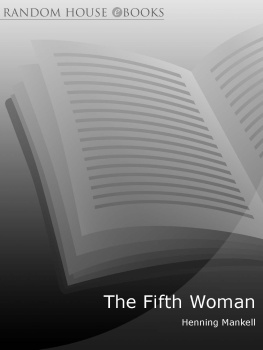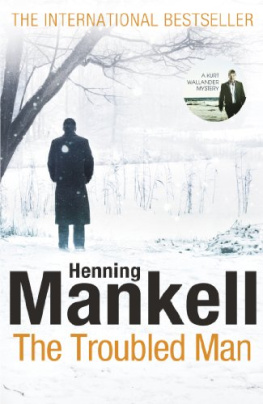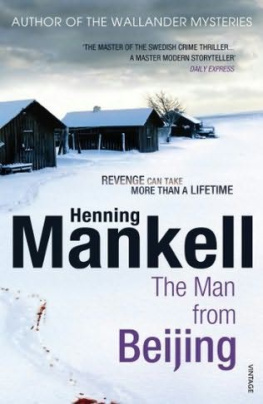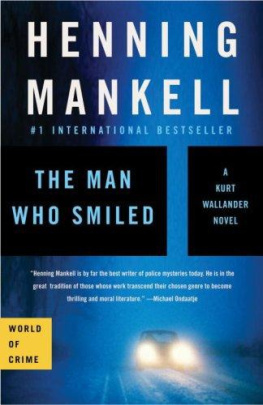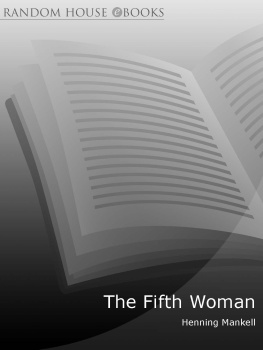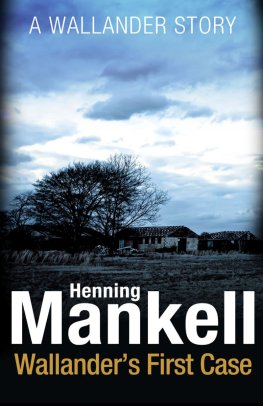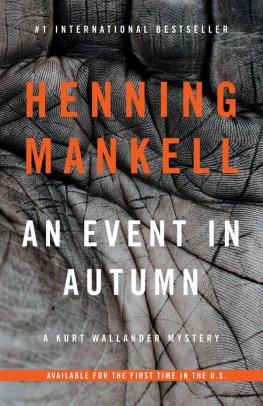Foreword
by Archbishop Desmond Tutu
Henning Mankell is a most remarkable man. The bestselling author of detective stories in many countries, he has become almost a cult figure in much of the world (though perhaps it is his great creation, chief inspector Kurt Wallander of the Ystad provincial police force, whos really the cult figure).
A talented artist who with strokes of his brush evokes the dampness and cold of Sweden and also the smoke-filled atmosphere of the desert townships in South Africa, Henning Mankell keeps us filled with anticipation. And as we follow with bated breath Kurts intuition, stalking his prey, we wonder all the while whether the underworld will get the best of our hero. And we all sigh with deep relief when the criminal is cornered and good triumphs, as we hoped it would, over evil.
It is one thing to consider the creator of Kurt Wallander, but every bit as interesting and important are Henning Mankells remarkable efforts to build bridges between Africa and Europe, efforts begun at an early age, with the hope of bringing education and reconciliation between these two continents. These were the efforts for which Mankell was honored with the Tolerance Prize in Germany in the Spring of 2004.
Henning Mankell has dedicated himself to the fight against AIDS, which is devastating the African continent and sub-continent. Thank to his efforts, memory books and Project AIDS have done an enormous amount to raise awareness of the epidemic. By encouraging parents to recall their life stories, not just for their children, but also for humanity, Henning Mankell has given a great gift to the world. Through South Africas Truth and Reconciliation Commission I have been amazed at how important telling ones stories turned out to be in helping people to heal. Their enormous therapeutic value cannot be overestimated. A young man who had been blinded by police action in his township came to the commission and told his story, and he was asked afterwards, How do you feel? You are still blind. He replied, Ah yes, but now I can see.
Henning Mankell has used his considerable talents as an artist to build bridges, much as Daniel Barenboim, the previous prize winner, has used his music to advance the course of peace in the Middle East. Through his works, Henning Mankell has expressed his belief in solidarity between different peoples. I, as a Christian, have been trying to do much the same kind of thing. Gods dream is that we realize that we are all Gods children, that we are members of one family: Gods family, a family, in which there are no outsiders, only insidersall belong. All are held in the embrace of a love that will not let go. Every one of us is precious. White, black, rich, or poor. All. Gay. Lesbian. All belong in this family. God has no enemies. So that a Bush, a Bin Laden, a Saddam Hussein, an Arafat, a Sharon, all, all belong.
Henning Mankell was born on February 3, 1948, in what he has described as a damp, cold part of Sweden. Together with his brother and sister, he was raised by a divorced father, a judge, who was so caring that Henning did not miss his mother. At thirteen, he went to Stockholm and worked in a theater. And he fulfilled his childhood dream when, in 1972, he went to Africa for the first time. As he said, much later, Africa made him a better European, and gave him perspective.
Since 1985, Henning Mankell has commuted between Sweden and Maputo, Mozambique. He writes with a rhythm, devoting mornings to writing so that in the afternoon he can be involved with his beloved theater company. When the country was devastated by floods in 2000 and hundreds of people were dying, Henning Mankell provided assistance together with Doctors Without Borders, lamenting the fact that Western aid had come too late and was too little.
Mankell has also written a play called Butterfly Blues for a theater in Graz, Austria, the land of Joerg Haider, famous for his racist anti-immigration policies. The play is about daily discrimination and harassment of the so-called Third World immigrants. Some of the actors in the play came from Mozambique and others from Austria, and they did not understand one anothers languages. Henning Mankells vision is of human beings from different origins and places living together, not separated by the walls, stones, wars, or laws which divide them.
Henning Mankell uses a range of different literary genresmysteries, novels, stories about teenagers. He says that his crime stories are merely mirrors held up to examine society. He asks the question, Should a society be based on solidarity or not? And there is no doubt about what his answer is. Henning Mankell has had the courage and the passion to challenge the affluent First World not to be so obsessed with their own issues such as capitalism, alienation, and political disillusionment. He challenges the citizens of that part of Gods world to be concerned about poverty, about hunger, about violence, which dont happen exclusively in the so-called Third World.
We are all in the world bound up in a common humanity. A person is a person through other persons. I can be human only in relationships. I can be me only when you are you. We are bound up in a common humanity that shares the vulnerability of being human, but also shares the strengths of solidarity.
The world is much more insecure now than it has ever been. Military might does not mean security. The war against terror can never be won, so long as conditions exist which make people so desperate that they resort to acts of desperation. We belong together. We can be human only together. We can survive only together. We can be free only together.
When we hear a cry for help on the stairs, we can either turn on our televisions louder or we can help. Henning Mankell would rather fall over dead than turn on his television louder. And he shows us that we do have a choice. As Martin Luther King Jr. once said, either we learn to live together as brothers (and sisters) or we perish together as fools.
Henning Mankell shares with Kurt Wallander the love of music, and of Mozart. But most importantly, he shares with him a belief in the counsel contained in Proverbs to speak up. We must speak for those who cannot speak for themselves. I Die, But My Memory Lives On is a deeply moving account of Henning Mankells personal responses to AIDS and its victims, both parents and the children left behind far too soon. In the midst of the death and suffering, a young girl plants a tree. She nurtures it as a fragment of life that will grow and survive and, like the memory books, outlive this global crisis. By highlighting and humanizing this catastrophe, Henning Mankell shows a way to help. As Mankell writes in I Die, But My Memory Lives On, These memory books, small exercise books with pasted-in pictures and texts... could prove to be the most important documents our time has produced.


